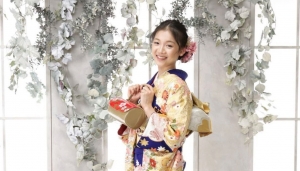Musings After Watching “Three Kingdoms”
Since we are touring in North America, we have spent most of our time on the tour bus, not counting our stays in hotels and theaters. Lately on the bus, we’ve been watching quite a few episodes of the Chinese television drama “Romance of Three Kingdoms.” It is an epic chronicling the tales of many heroes each contending to gain control of the Middle Kingdom, each possessing great abilities, and each fueled by equally great ambitions.
My favorite character is Liu Bei of the Peach Garden Brotherhood. He is a man of principle. I once read such a statement: a person is always free to change his stance, but must remain resolute in his principles. Liu Bei has very noble principles. His benevolence and righteousness won the people’s hearts and helped his kingdom prosper. When Cao Cao planned to invade the province of Xu, all the neighboring warlords became anxious about protecting themselves. Nobody was willing to come to the aid of Tao Qian, the magistrate of Xu. The warlords looked on apathetically, all full of empty talk and the desire to evade responsibility.
Only Liu Bei suggested that they help Tao Qian. He said, “Tao has always been loyal and righteous. Cao Cao is taking an unfair advantage by attacking Tao when he is down. In this turbulent age, military power determines supremacy, but ultimately he who wins the people’s hearts will succeed in unifying the country.” During times of trouble, Liu Bei opted to sacrifice his own forces in order to support rulers he considered virtuous. He was determined to support a noble leader and was unafraid to go against Cao Cao. In my mind, Liu Bei is a true hero.
This makes me ponder. If I were to compare the field of music with a battlefield, what kind of musician would triumph as the ultimate victor?
Perhaps this depends on each person’s definition of “victory.” Personally, I think victory should go to the one whose music delights both the body and mind, is full of hope, and can inspire people to do good. Traditional Chinese culture is very particular about musical ceremonies: the ancient Chinese believed that music’s purpose was to improve one’s soul, elevate one’s nature, and mold one’s character. Through music, the ancients hoped to achieve the ultimate state of harmonizing with nature.
An admirable artist must have a character worthy of admiration. Cellist Yo-Yo Ma has said that his greatest inspiration was the world-famous cellist Pablo Casals. Casals stated: “I am a human being first, a musician second, and a cellist third.” Yo-Yo Ma’s mother Marina Lu said in an interview with The New Epoch Weekly, “His [Yo-Yo Ma’s] kindness and sincerity are far more important to me than his success as a cellist.”
Ms. Marina Lu told a story of Yo-Yo Ma during his time at Harvard University. Yo-Yo noticed that an African American girl living in his dormitory building never ate breakfast. One day, he bought breakfast for her and hung it in a plastic bag on her doorknob. With it, he attached this note: “Eating breakfast is good for your body.” The next day, the young lady wrote him a note in response: “Thank you, Papa Yo-Yo!” Ms. Lu said that Yo-Yo Ma treated everyone in this kind manner regardless of his nationality or race.
She told of another incident during the former Chinese Communist Party leader Jiang Zemin’s visit to America. President Clinton had invited Yo-Yo Ma to the White House reception honoring Jiang’s visit. Yo-Yo Ma was placed beside Jiang at the banquet table. During dinner, he commented to Jiang about the way he and the Communist Party were handling the Tibetan situation. Jiang was very put out and didn’t say a word.
Ms. Lu said that this incident made Jiang hostile towards Yo-Yo Ma. He was blacklisted by the Chinese Communist party and not allowed to perform in China for quite a few years. “But the people like him. They liked his music and wanted him to go back to perform a concert… He knew very well that Jiang disliked hearing that kind of criticism, but that didn’t make him afraid. He dares to do things like this; he dares to tell the truth and I admire him for it. Although Jiang Zemin didn’t like Yo-Yo, the people did. He’s not political. It’s the people whom he cares about; he’s very kindhearted.”
Therefore, I believe that in order to become an outstanding musician and a “victor” in the battlefield of music, one must be benevolent and have love and kindness for all. The Artistic Director at Shen Yun once told us, “If a person living in this world is able to do a few good things for humanity, then his entire life is purposeful and worthwhile.”
The path of an artist is arduous and competition is ruthless. But if he is able to inscribe life’s principles deep in his heart, this artist will never go adrift or lose his course.
People are often moved to tears while watching our show. Many audience members say that it’s beyond a spectacular artistic performance; each program is filled with deep inner meaning and a powerful energy that inspires people to strive forward. Oftentimes during intermission or after the show, people will come down to the orchestra pit to talk with us and lavishly express their excitement or praise.
The great Chinese philosopher Lao-Tzu said: “The master contests not, and is incontestable.” Everyone in Shen Yun works tirelessly, not for monetary reward or personal reputation, but because they genuinely want to share traditional Chinese culture with the audience. This is a much more noble aspiration. It’s an eternal and undying quest.

Yue Huang
Contributing writer
March 26, 2011






